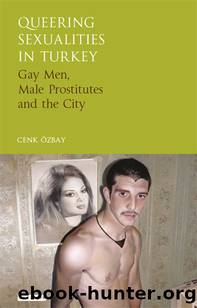Queering Sexualities in Turkey by Cenk Özbay

Author:Cenk Özbay [Özbay, Cenk]
Language: eng
Format: epub
ISBN: 9781350987678
Google: otQfyQEACAAJ
Publisher: Bloomsbury Publishing
Published: 2017-01-15T03:33:38+00:00
A Self-Destroying Representation: Is it Possible to Talk About Rent Boys?
Under what circumstances and through which cultural mediations do rent boys become visible in the eyes of the public? More importantly, how can a public know about the idea of male prostitutes, their deviant careers, their back-alley presence in the city, their perverse mobilities and the discourses about queer sexual economy if the members of this public are not interested in having compensated sex with rent boys? If they are curious about or interested in the subject matter, how has this inquisitiveness been formed and guided?
As I have recounted in Chapter 2, on one of the weekly episodes of a reality documentary show on a national TV channel in Turkey, audiences saw the police walking into a gay sauna with a hidden camera and heard negotiations between rent boys and police officers. Readers of a national weekly news magazine might have encountered cover stories that examined the âincreasing decadence around male sex work in Taksim Square.â Millions of people in Turkey, whose only imagined common denominator is ânormalcy,â had access to a representation of the rent boy identity and its contested, constructed reality. Examining these representations and the discourses that circulated during these historical moments could critically challenge notions about the conditions of men's involvement as sellers in sex work and compensated sex, the (dis-)identification of rent boys and gay men and all the tacit associations with masculinity, sexuality, pleasure, social morality, public order and health, the informal economy and the diversity of urban life.
Sex work has traditionally been framed as an absolute departure from one's dignity and emotional-spiritual integrity, a rupture between the body and self, and the last and lowest survival strategy that the poor victim has; a high risk situation that is open to danger and violence, exclusion and separation from social networks, including family, friends and kin. It represents a radically different and more substandard life than one might have had. Common-sense ideas about sex work also produce a deeply sexist discourse. Those performing the oldest job in the world, who are subject to the painful experiences I mention here, are believed to be women. In the Turkish context, while men can and are supposed to do everything in order to earn money and take care of their families, becoming âdirtyâ and agreeing to be used for money are reserved only for women.12 That possibility does not exist for men; men's capacity to sell sex to other men is unthinkable. Even if it is thought, there is no possibility to express it in the language.13
The discursive construction of rent boys impairs the gendered and sexist approaches to sex work in a significant extent. Rent boys in Istanbul are not victims, and they are not in miserable conditions; they do not have to sell sex, it is not a survival strategy for them.14 Rather, all my observations and their narratives have verified that they can otherwise live with their families, relatives and friends without involvement in queer prostitution, which only generates small, irregular amounts of money.
Download
This site does not store any files on its server. We only index and link to content provided by other sites. Please contact the content providers to delete copyright contents if any and email us, we'll remove relevant links or contents immediately.
| Bahrain | Egypt |
| Iran | Iraq |
| Israel & Palestine | Jordan |
| Kuwait | Lebanon |
| Oman | Qatar |
| Saudi Arabia | Syria |
| Turkey | United Arab Emirates |
| Yemen |
Empire of the Sikhs by Patwant Singh(23084)
The Wind in My Hair by Masih Alinejad(5095)
Rise and Kill First by Ronen Bergman(4788)
The Templars by Dan Jones(4689)
The Rape of Nanking by Iris Chang(4211)
12 Strong by Doug Stanton(3548)
Blood and Sand by Alex Von Tunzelmann(3203)
Babylon's Ark by Lawrence Anthony(2677)
The History of Jihad: From Muhammad to ISIS by Spencer Robert(2628)
No Room for Small Dreams by Shimon Peres(2368)
Inside the Middle East by Avi Melamed(2356)
The Turkish Psychedelic Explosion by Daniel Spicer(2356)
Gideon's Spies: The Secret History of the Mossad by Gordon Thomas(2350)
Arabs by Eugene Rogan(2299)
The First Muslim The Story of Muhammad by Lesley Hazleton(2271)
Come, Tell Me How You Live by Mallowan Agatha Christie(2260)
Bus on Jaffa Road by Mike Kelly(2159)
1453 by Roger Crowley(2030)
Kabul 1841-42: Battle Story by Edmund Yorke(2029)
